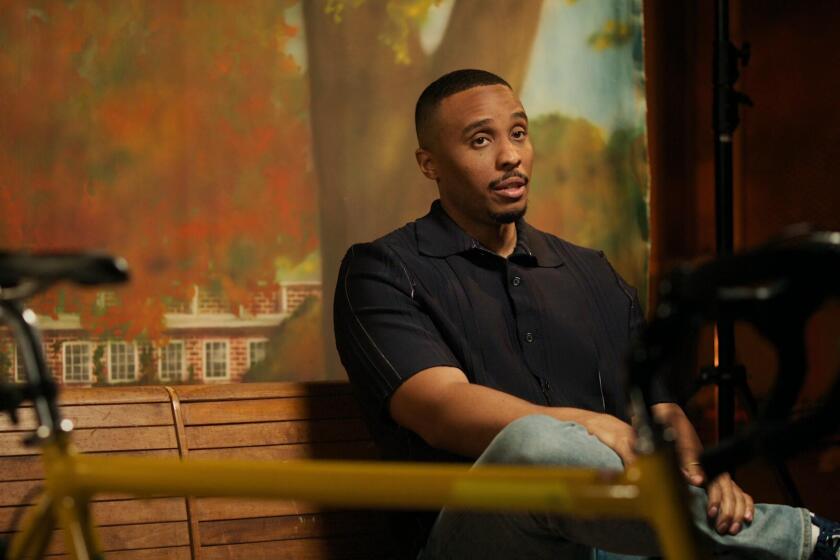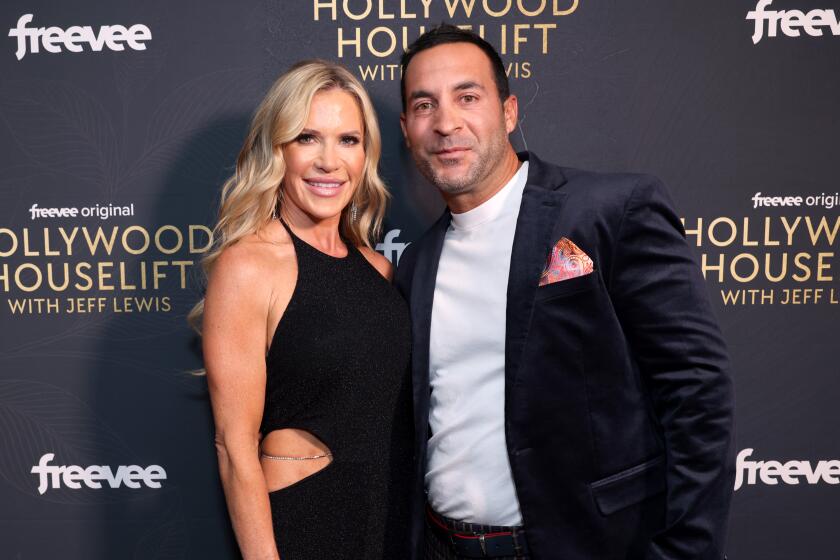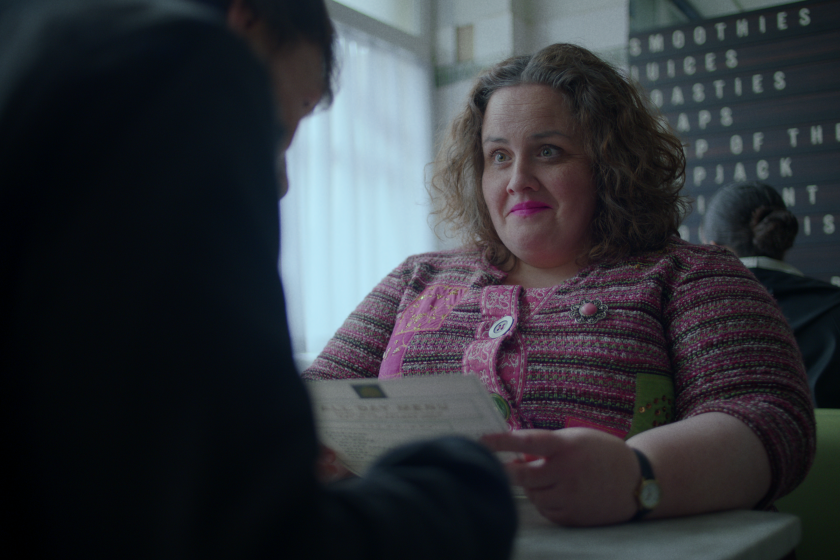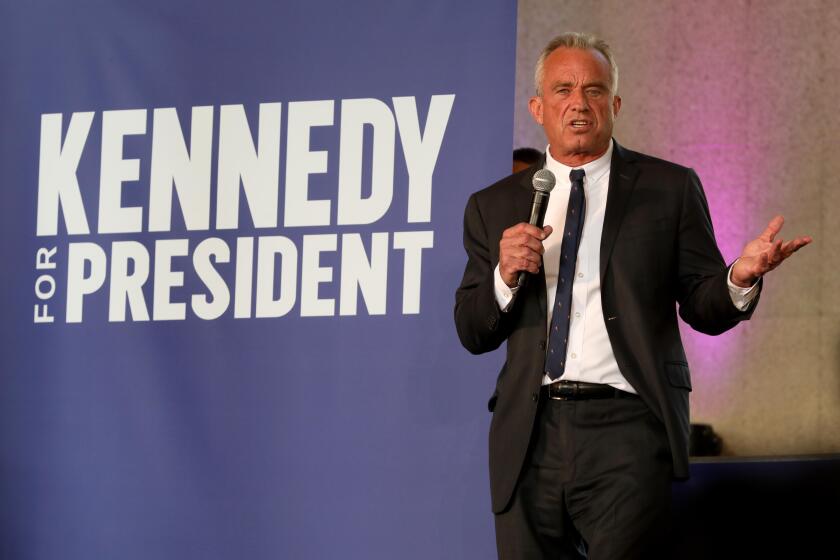Funny How He Speaks His Mind
It’s Paul Rodriguez live . . . at an amusement park?
“The only reason I’m doing this is because they offered me free admission for a month,” the comedian jokingly says of his appearances this weekend at Knott’s Funny Farm, a special comedy weekend at Knott’s Berry Farm in Buena Park.
“I got the better bargain because they have no idea how many Rodriguezes are related to me.”
The 43-year-old comedian is enjoying the fruits of his long stand-up career these days, with a house on the Venice canals, a series of well-done El Pollo Loco commercials (a particularly memorable one has Rodriguez meeting up with the Taco Bell Chihuahua in a parody of the rival fast-food chain) and maybe, just maybe, another shot at his own sitcom.
Always outspoken, Rodriguez is sometimes cast as a role model for the Latino entertainment field, a designation that has its dangers. For instance, he acknowledges that he voted for Proposition 227 to eliminate bilingual education in the public schools, an unpopular decision among some of his Latino friends.
But Rodriguez has never been a good fit as an advocate or spokesperson. For one thing, he’s a comedian, which is not a job for the politically correct. And besides, Rodriguez hates the way “Latino” is permanently affixed to his job title, when no one says “Jewish comedian Jerry Seinfeld” or “African American comedian Eddie Murphy.”
“My only concern is to be funny every night,” he says flatly.
At the same time, however, Rodriguez continues to reap some benefits. Ask the casual observer to name a Latino comic and, if he can name any, it will probably be Rodriguez. That name recognition is partly why the comic is in the running for his fourth sitcom, “The Paul Rodriguez Show,” which the WB Network is weighing for a spot on its midseason schedule.
In the meantime, Rodriguez’s TV work (El Pollo Loco spots, HBO comedy specials and, last month, hosting stints on the Fox Kids’ hidden-camera series “Gotcha”) and his thriving stand-up comedy career combine to make him something of an oxymoron--a millionaire stand-up comic.
Rodriguez was interviewed after a recent show at the Laugh Factory in Los Angeles, where he was readying material for spots on “The Late Show With David Letterman” and “Comic Relief 8.”
Question: You grew up with bilingual education. So why did you vote against it?
Answer: My father actually took the time to go to the school and insisted that none of his children have bilingual education, which is not a popular view among Hispanics. My father said, “You’re not going to get a job in this country because you know Spanish. You’re going to get a job because you know English.” From my point of view, the hearts of Hispanic leaders are in the right place, but in terms of practicality, [bilingual education] does not work.
Q: You were born in Mexico. When did you come to the United States?
A: I was 2. We were migrant farm workers. So growing up, I went to like 15 different schools. My father was always moving us. We would follow the crops. We would pick cotton in the Rio Grande Valley in Texas, we’d go as far as Minnesota and pick sugar beets. We’d end the season in Washington state picking apples. So I was always the new kid in school. Which I guess kind of made me what I am today in the sense that I used humor to make friends.
Q: And you eventually settled in Los Angeles?
A: What happened was my father broke his back in a farming accident; a tractor ran over him. We moved to San Pedro, where my mother used to clean fish at Terminal Island, and I went to Barton Hill Elementary. And then my mom lost her job because she got phlebitis. I had an aunt who lived in Compton. So we moved there. During the summers we’d still go pick. . . . I bought my mom and dad a farm in Fresno when I started to make a few bucks, and my mom and brothers and sisters still live there.
Q: You got into stand-up comedy in the late 1970s, when the scene was hitting a peak in L.A.
A: In 1979, for $5 at the main room of the Comedy Store, you could see David Letterman be the master of ceremonies, and that night you would see Gallagher, Jay Leno, Robin Williams and Yakov Smirnoff. And then the doormen were Andrew Dice Clay, Sam Kinison, myself and, a couple of years later, Jim Carrey. If a comic was late or a comic didn’t show up, [the doormen] were the replacement. I used to get paid a few dollars more to baby-sit Pauly Shore.
Q: It seems, remembering those times, that stand-up has suffered from overexposure on TV.
A: A lot of the youngsters you see today, stand-up is not their first love. They’re using stand-up so they can become “Martin” or get a part in a movie. . . . In the old days, you needed at least a half hour of material before you were even considered for the Carson show. . . . Everyone up there had earned it.
Q: For a long time, you were accused of trading on Latino stereotypes in your act. Do you still hear that criticism?
A: I’m sure I have my detractors, but I have never worried about those who don’t like me. I can’t do anything about that. . . . The thing is, my audiences aren’t all Mexican. My audiences are white college kids who saw me on Letterman or Leno or Comic Relief, and a lot of Latinos who are college-educated. I think I have reached a certain amount of benevolent neglect or respect, that’s still up in the air. I speak my mind. Early on, the criticism was that all my jokes were derogatory toward Mexican Americans. I’m talking about perhaps 15 years ago. But that’s all I knew. All I knew was hubcap taco jokes. [Now], I talk about topics that anybody would like. . . . I still have the distinction that any time there’s a story written about me, in the Los Angeles Times or any other place, I am always pegged “the Latino comedian Paul Rodriguez.” No one ever says black comedian Richard Pryor, black comedian Eddie Murphy. No one says Jewish comedian Jerry Seinfeld. No one says Korean comedian Margaret Cho.”
Q: Do you still get offered parts that stereotype Latinos?
A: I don’t take them anymore. There was a horrible, horrible part on [CBS’] “Walker, Texas Ranger,” and coincidentally enough about two months ago I saw the part that they wanted. I [would have been] a gang leader who does a drive-by [shooting]. . . . They’re able to do that with Hispanic Americans because we don’t have any Hollywood clout. We don’t have any leadership really. We don’t have someone like Jesse Jackson, someone who will knock heads and say, “We don’t go for this.” What’s distressing is that there are no Latino executives. It’s even more important to have Latinos behind the cameras than in front of the cameras. Because very few artists have any clout or power whatsoever. The power is in the boardrooms, and we need to have people who are high or middle developers at the studios. . . . This is why Hollywood continues to make the same mistakes. When you see “Godzilla” and there are no Hispanics in New York, you know it’s not factual. Because in New York City you can’t throw a rock and not hit a Puerto Rican on the head. You have a movie like “Volcano” that takes place in Los Angeles and there are no Hispanic actors. Here’s my question to Hollywood: How can you do a realistic portrayal of Los Angeles and ignore the 3 1/2 million Mexicans who live here? They feel that Hispanic Americans will not be successful in the movies because they feel we don’t have a loyal moviegoing public. Nothing could be further from the truth.
Q: Now you’re trying to get your sitcom, “The Paul Rodriguez Show,” on the air. After the failures of “a.k.a. Pablo,” “Grand Slam” and “Trial and Error,” are you wiser about what it takes?
A: I am the McLean Stevenson of my people. I’ve been canceled on every network. But the shows that I’ve had, in hindsight, weren’t funny enough, and the Latino audience was too fragmented. Now, at 43 years old, I have a better perspective. What I’m trying to do now is a “Cosby”-esque kind of thing. I’m trying to make a funny show instead of trying to make a Latino show. . . . This time, I got the money and paired up with writers who shared my sensibility. Before I wrote this with [co-creator] Bill Masters, I made him come and see me [do stand-up] every day for a month. So he could get my timing, my persona, how I weave my story.
Q: Who are some of the newer Latino comics you like?
A: I’ve got my money on Willie Barcena. I think he’s gonna break. I think George Lopez is very funny. I think things will happen for him. Carlos Mencia, I gave him his first break, I was the executive producer of the “Loco Slam” on HBO. Jackie Guerra, I admire and respect her. So there is a camaraderie, there is a brotherhood and there are others coming.
Q: It seems comedy is already divided by race and gender. Clubs in Los Angeles have nights for gay comics, for Latino comics, for African American comics. Is it a Catch-22, because while the shows give more comics a chance, they also get identified by their race?
A: I think if you’re funny, you should be able to go up at gay night and be funny, or at Phat Tuesday and be funny. I’m at the place now where I’ve made a few bucks, I’m comfortable. The pool’s in, the patio’s dry. I live in Venice Beach right on the canals, I bought my parents a home, I own about 800 acres of farmland. It would be easy for me to stay home and watch my big-screen TV. But I can’t do that. I can’t go on Letterman and suck. That would undo all the work I’ve done. . . . Look, I just want your readers to know that if any of you are even slightly thinking of feeling sorry for me because I haven’t reached the heights that I could reach, don’t. I’m doing OK. I’m quite happy. Comedy, show business and America don’t owe Paul Rodriguez a damn thing. Considering where I came from and where I’m at now, it’s a long way from Compton to Venice.
The complete guide to home viewing
Get Screen Gab for everything about the TV shows and streaming movies everyone’s talking about.
You may occasionally receive promotional content from the Los Angeles Times.



